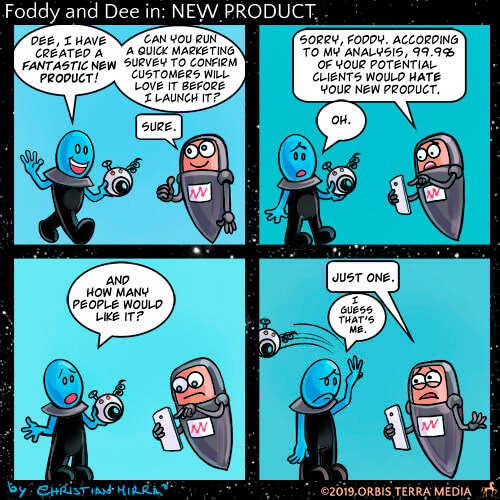When Passion is not Enough: The Importance of Market Research

If you’re going to sell a product, you need to love it. After all, if you aren’t convinced, why should anyone else be? That passion and conviction is going to carry you over a lot of hurdles through the many hard times you’ll inevitably face as a new start-up or to get a new product line off the ground.
However, your love for your innovative product or service can sometimes be a disadvantage too. It can be like wearing a pair of blinkers. You are so convinced about your product’s potential that it becomes hard to imagine someone might not share your excitement.
A market-oriented product strategy that focuses on consumer preferences is one of the basic ingredients of every successful commercial venture.
This is why market research is so important. A market-oriented product strategy that focuses on consumer preferences is one of the basic ingredients of every successful commercial venture. However, while market needs should always dictate your product design, the way you tackle new product development and the lifecycle management of an existing product is very different.
Market Research for New Product Development
In any new product’s journey into life, you need to understand its market potential before making important investment decisions. Market research undertaken with the audiences to which you hope to market the product plays a vital role in developing this understanding.
If your findings confirm the validity of your business idea, this validation will also play well into the investment decisions any potential funding partners will make. On the other hand, you may find out that your customers don’t like your idea as much as you think they would. Though unpleasant, this kind of result will save you a lot of time, money and heartache in the long run.
Market research undertaken with the audiences to which you hope to market the product plays a vital role in developing this understanding.
If the project is green-lighted, there are several additional phases of market research that need to be integrated into your product development plan.
New product development teams usually gather small focus groups made up of your target audience to test concept, design, prototype, the various revisions of the prototype and the launch messaging. It all needs to be considered from the point of view of your would-be consumers.
This way, when you complete the new product development process, you can launch with full confidence you’ve given your idea the very best start it could have.
Market Research for Product Lifecycle Management
Market research isn’t a one-time endeavour. In this time of digitalisation and huge disruption, products, services and the way they are delivered are in flux; consumer needs and expectations change over time and need continual monitoring.
One way to manage this era of unprecedented social and technological upheaval is to pay closer attention to product lifecycle management. Continuous market research is just one part of a detailed analysis that looks at social, technological, legal, environmental and competitive risks. It is, nonetheless, a crucial aspect to ensuring that your existing products retain their relevance to your consumers.
One way to manage this era of unprecedented social and technological upheaval is to pay closer attention to product lifecycle management.
We have developed more sophisticated ways of measuring consumer desires and expectations now, with faster response times and more immediate insights – all based on pulling in data from a wider range of sources.
Data analytics is helping to remove some of the guesswork from product management to the benefit of investment, production and marketing strategies.
If your consumer research shows that products in your portfolio are losing their value for customers, you can anticipate their going out of use. These are your “cash cows”, for which you need to minimise investment and maximise returns while you still have a market. Now is the time to start rethinking new product development!

